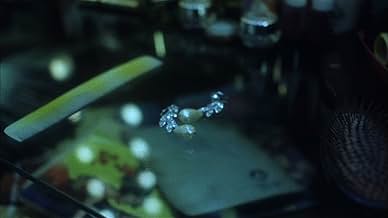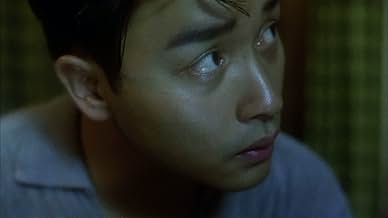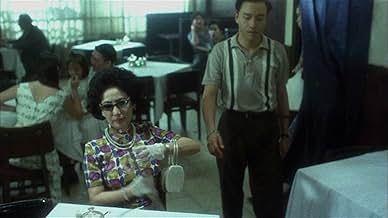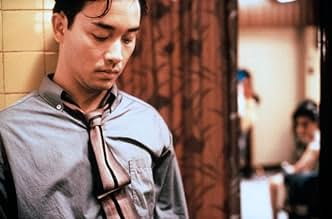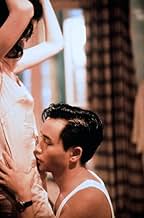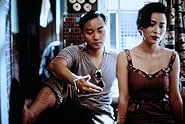IMDb रेटिंग
7.4/10
27 हज़ार
आपकी रेटिंग
अपनी भाषा में प्लॉट जोड़ेंA man tries to find out who his real mother is after the woman who raised him tells him the truth.A man tries to find out who his real mother is after the woman who raised him tells him the truth.A man tries to find out who his real mother is after the woman who raised him tells him the truth.
- पुरस्कार
- 17 जीत और कुल 9 नामांकन
Rebecca Pan
- Rebecca
- (as Tik-Wa Poon)
Tony Leung Chiu-wai
- Chow Mo-wan
- (as Tony Chiu Wai Leung)
फ़ीचर्ड समीक्षाएं
In Wong Kar-wai's 1991 film Days of Being Wild, Yuddy (Leslie Cheung), a charming drifter captures the attention of store attendant Su Lizhen (Maggie Cheung) by asking her to look at his watch. When she sees that it says one minute before 3:00PM on April 16, 1960, he tells her that she will never forget the moment and will dream about him that night. The next time they meet, the moment becomes two, then one hour, then weeks and months but Yuddy is like the mythical bird with no legs that just flies and flies and never lands. Abandoned by his real mother and brought up by a wealthy alcoholic courtesan (Rebecca Pan), he does not know where he came from or where he is going. He treats women with little respect, discarding them when they no longer serve his purpose. When one lover asks him if he loves her, he tells her that during his life he will be friends with many, many women but won't know whom he truly loves until the end.
Days of Being Wild unfolds like a dream with color filters, unusual shadows, and the sights and sounds of Hong Kong's rainy nights and sweltering summers. Based on the director's memories from his childhood and admiration for the style of Argentinean novelist Manuel Puig (Heartbreak Tango), the film is a series of episodes involving six people who touch each other's lives. After his short-lived relationship with Su, Yuddy meets a cabaret dancer who calls herself Mimi (Carina Lau) but their relationship fares no better and she is left to suffer the consequences of their breakup. Meanwhile, Su meets Tide (Andy Lau), a gentle policeman whom she is able to confide until he suddenly leaves Hong Kong to become a sailor. Each character seeks a sense of identity and fulfillment. After Rebecca tells him of her plans to move to America with her boyfriend, she finally lets him know who and where his real mother is. After Yuddy goes to the Philippines to try to find his mother, the lives of the main protagonists come together in a powerful conclusion.
Days of Being Wild may sound like a soap opera but the film reaches a much higher artistic level. Supported by outstanding performances by Leslie Cheung, Maggie Cheung, and Jacky Cheung as Yuddy's only friend Zeb, it is a tone poem about longing and one's search for identity. We care about the characters even though they don't seem to care about themselves. Like many of us, they pine for the things that might have been, the word that was never said, and the love that remains elusive. A commercial failure but an artistic triumph, Days of Being Wild is a moody, atmospheric film that with its background of popular music, in this case 1950's rumbas and cha-cha's, forecasts the director's later In the Mood For Love. As a beautifully realized example of alienated people desperately seeking their place in the world, however, it stands securely on its own.
Days of Being Wild unfolds like a dream with color filters, unusual shadows, and the sights and sounds of Hong Kong's rainy nights and sweltering summers. Based on the director's memories from his childhood and admiration for the style of Argentinean novelist Manuel Puig (Heartbreak Tango), the film is a series of episodes involving six people who touch each other's lives. After his short-lived relationship with Su, Yuddy meets a cabaret dancer who calls herself Mimi (Carina Lau) but their relationship fares no better and she is left to suffer the consequences of their breakup. Meanwhile, Su meets Tide (Andy Lau), a gentle policeman whom she is able to confide until he suddenly leaves Hong Kong to become a sailor. Each character seeks a sense of identity and fulfillment. After Rebecca tells him of her plans to move to America with her boyfriend, she finally lets him know who and where his real mother is. After Yuddy goes to the Philippines to try to find his mother, the lives of the main protagonists come together in a powerful conclusion.
Days of Being Wild may sound like a soap opera but the film reaches a much higher artistic level. Supported by outstanding performances by Leslie Cheung, Maggie Cheung, and Jacky Cheung as Yuddy's only friend Zeb, it is a tone poem about longing and one's search for identity. We care about the characters even though they don't seem to care about themselves. Like many of us, they pine for the things that might have been, the word that was never said, and the love that remains elusive. A commercial failure but an artistic triumph, Days of Being Wild is a moody, atmospheric film that with its background of popular music, in this case 1950's rumbas and cha-cha's, forecasts the director's later In the Mood For Love. As a beautifully realized example of alienated people desperately seeking their place in the world, however, it stands securely on its own.
I like movies where outcast characters drift through the margins of life in search for not simply meaning, this is a grand word and drifters don't have much time for grandstanding, but a small warm corner they can call their own, and there's a lot of drifting in Days of Being Wild, literal and figurative. This is one of those great movies that speak of what it means to be young and alienated, not in the angsty living-room sense of the term, but in the form of real tangible problems, the ones you face alone in the cheap room of a fleabag hotel or in an empty warehouse in the hours after work. Days of Being Wild to me is like a procession of life, in the small hours of the night, filled with beauty and pain.
Now when all the normal people with steady jobs and a steady family have gone to sleep, all those still hanging in the balance of existence come out and fly beneath the cold street lamps. Now and then their wings touch, for a fleeting moment, and then they're alone again, flying in circles around the street lamps, like a moth instinctively drawn to something that is bright and warm. This reminds me of the line spoken by Warren Oates in that quintessential American movie about alienation and drifting, Monte Hellman's Two-Lane Blacktop: "if I'm not grounded soon, I'm gonna go into orbit". Hollywood rarely understands this type of character. Only someone who has never experienced that directionless orbit can glorify the drifting. The characters here need to be grounded soon. They need human warmth and affection and to know that there's a place they can come back at night and call it home.
We usually think of a drifter as someone who sets off into the desert, into a bleak barren landscape, it's probably easier that way. It takes a step back to look at life around us, as we wait for the subway in crowd, to realize a drifter can be a drifter among people. American film noir treats the city as an 'asphalt jungle', while for some reason Asians seem to tap into the melancholy of the 'asphalt desert'. I'm thinking films like Johnnie To's PTU and Takashi Miike's Rainy Dog. This is one of those films. One of the characters is a cop who does a latenight patrol, always wandering around empty streets by himself. He confesses a little later, that he wanted to be a sailor. The metaphor is poignant.
But at the same time Wong-Kar Wai says a lot of things about compulsion, that driving monomania that sets these people into orbit, and disassociates them from the world. I like how all this plays out in a 50's Hong Kong of cold blue lights and wet streets reflecting neon lights from a distant shop sign. It's not Chungking Express yet, and I'm glad that it's not, Chungking is a vibrant colorful place, and this one is a world that begins a corner down the street from it, where the bustle of city life, where the other people live their lives, is but a faint echo. In fact, until the movie washes up in the Phillipines to get involved in a brawl and take the night train out of the world, we hardly see any people outside the six characters, the small birds whose wings touch now and then.
This is raw and touching and real, like the best of gritnik cinema done by a romantic. Sam Peckinpah was another big romantic of gritnik cinema, but his romance was masculine and fatalist, he was speaking about the ends of things. Wong-Kar Wai tells us about love and obsession, and what it takes for something to begin. Good stuff.
Now when all the normal people with steady jobs and a steady family have gone to sleep, all those still hanging in the balance of existence come out and fly beneath the cold street lamps. Now and then their wings touch, for a fleeting moment, and then they're alone again, flying in circles around the street lamps, like a moth instinctively drawn to something that is bright and warm. This reminds me of the line spoken by Warren Oates in that quintessential American movie about alienation and drifting, Monte Hellman's Two-Lane Blacktop: "if I'm not grounded soon, I'm gonna go into orbit". Hollywood rarely understands this type of character. Only someone who has never experienced that directionless orbit can glorify the drifting. The characters here need to be grounded soon. They need human warmth and affection and to know that there's a place they can come back at night and call it home.
We usually think of a drifter as someone who sets off into the desert, into a bleak barren landscape, it's probably easier that way. It takes a step back to look at life around us, as we wait for the subway in crowd, to realize a drifter can be a drifter among people. American film noir treats the city as an 'asphalt jungle', while for some reason Asians seem to tap into the melancholy of the 'asphalt desert'. I'm thinking films like Johnnie To's PTU and Takashi Miike's Rainy Dog. This is one of those films. One of the characters is a cop who does a latenight patrol, always wandering around empty streets by himself. He confesses a little later, that he wanted to be a sailor. The metaphor is poignant.
But at the same time Wong-Kar Wai says a lot of things about compulsion, that driving monomania that sets these people into orbit, and disassociates them from the world. I like how all this plays out in a 50's Hong Kong of cold blue lights and wet streets reflecting neon lights from a distant shop sign. It's not Chungking Express yet, and I'm glad that it's not, Chungking is a vibrant colorful place, and this one is a world that begins a corner down the street from it, where the bustle of city life, where the other people live their lives, is but a faint echo. In fact, until the movie washes up in the Phillipines to get involved in a brawl and take the night train out of the world, we hardly see any people outside the six characters, the small birds whose wings touch now and then.
This is raw and touching and real, like the best of gritnik cinema done by a romantic. Sam Peckinpah was another big romantic of gritnik cinema, but his romance was masculine and fatalist, he was speaking about the ends of things. Wong-Kar Wai tells us about love and obsession, and what it takes for something to begin. Good stuff.
There is an unpolished, raw, kind of grimy feeling to this film, one which maybe fits the sad, lonely little lives of these characters, few of whom are likeable. A young playboy (Leslie Cheung) who "hates work" treats a couple of women like disposable objects, and yet they can't seem to stop loving him. It's a type of story I'm not all that fond of, even if we gradually understand one of the things that seriously damaged him, and maybe made him into the self-centered asshole we see before us. His mother gave him up for adoption, and his stepmother only took him so she could get a regular paycheck. It was quite hard to empathize with him though, and I disliked the misogynistic overtones of the film. Even his nerdy friend gets in on it, slapping his second girlfriend (Carina Lau) around in the rain after she's been abandoned. My favorite moment was when a kind police officer tries to talk some sense into the first girlfriend (Maggie Cheung), and after they part, he narrates:
"I never really thought she'd call. But every time I passed by the phone booth, I'd stand there for a while. Maybe she's all right and she made it back to Macao. Or maybe she just needed someone to help her through that one night. Soon after that, my mother passed away, and I became a sailor."
The film desperately needed more humanizing touches like that, or some level of self-reflection or philosophy deeper than its bird metaphor. The painting of emptiness and loneliness that Wong Kar-wai gives us is undercut without it, though I did like some of the artistry in his camera work. Oh, and if you're as puzzled as I was about the character seen at the very end, it's a somewhat random/minor character who was meant to be the main character of the second part of the story, a film which was never made. Somehow the meaninglessness of that fits, though I'm not sure it's in a good way.
"I never really thought she'd call. But every time I passed by the phone booth, I'd stand there for a while. Maybe she's all right and she made it back to Macao. Or maybe she just needed someone to help her through that one night. Soon after that, my mother passed away, and I became a sailor."
The film desperately needed more humanizing touches like that, or some level of self-reflection or philosophy deeper than its bird metaphor. The painting of emptiness and loneliness that Wong Kar-wai gives us is undercut without it, though I did like some of the artistry in his camera work. Oh, and if you're as puzzled as I was about the character seen at the very end, it's a somewhat random/minor character who was meant to be the main character of the second part of the story, a film which was never made. Somehow the meaninglessness of that fits, though I'm not sure it's in a good way.
I guess the main reason that this is my favorite WKW movie is that it's one of the least abstract of his movies and I feel like the viewer becomes more emotionally involved with the characters because of that. The music, as always with WKW, is wonderful and the cinematography is fine, I especially like all the shots of the lush tropical forests. It isn't as beautifully photographed as many of his later films like chungking express and in the mood for love. And it doesn't feature much of the fancy techniques that WKW likes to employ in movies like fallen angels or happy together. Still I think this is my favorite of Wong Kar Wai's movies, not necessarily the best, but the one I enjoy the most. Highly Recommended.
This film was directed by the Chinese director, Wong Kar-Wai, who came to Western attention through his strange and quirky CHUNGKING EXPRESS. Because it was such an unusual and unique film, I decided to watch this other film. And, as in CHUNKING EXPRESS, DAYS OF BEING WILD was indeed a very unusual film--though with none of the kooky sensibilities of the other movie.
The film begins with a man trying to slowly ingratiate himself to a rather shy lady. Slowly but surely he is able to bring her out of her shell and after months of grooming her, he is able to bed her. To him, it's all a game and he has absolutely no regard for her or any other woman. But this nice lady is shattered and he could care less. Later, you see him pretty much doing the same thing in another self-centered relationship. While this is moderately interesting, what makes it even more so is his relationship with his foster mom. Their sick and dysfunctional interactions tell much about why he is who he is. The rest of the film concerns both of them as they separate and go their ways.
The DVD case compared this movie to the French film, LA RONDE. In most ways, this is very unfortunate, as both movies are excellent on their own and Wong Kar-Wai's film is not derivative. The only major similarities I saw is that both films involved sex and also showed how the two people at the beginning later had impact on others' behaviors as well. LA RONDE was about a large group of people and how sex (and an STD) unites them, while DAYS OF BEING WILD is about connections--and how some are unable to have deep or meaningful relationships. In this sense, it's a standout film. However, unfortunately, this also makes it a rather unpleasant film and is a bit difficult to watch--definitely NOT a date movie! It simply is NOT a fun film. But for someone who wants something with insights and is well directed and written, this is a film well worth seeing.
NOTE--While this film is about sexuality and the DVD case looks very steamy, there is no nudity in the film. This actually might be an excellent film for teens to see with their parents, as it opens up a great opportunity to talk about intimacy and sexuality--and how some cannot or will not combine the two.
The film begins with a man trying to slowly ingratiate himself to a rather shy lady. Slowly but surely he is able to bring her out of her shell and after months of grooming her, he is able to bed her. To him, it's all a game and he has absolutely no regard for her or any other woman. But this nice lady is shattered and he could care less. Later, you see him pretty much doing the same thing in another self-centered relationship. While this is moderately interesting, what makes it even more so is his relationship with his foster mom. Their sick and dysfunctional interactions tell much about why he is who he is. The rest of the film concerns both of them as they separate and go their ways.
The DVD case compared this movie to the French film, LA RONDE. In most ways, this is very unfortunate, as both movies are excellent on their own and Wong Kar-Wai's film is not derivative. The only major similarities I saw is that both films involved sex and also showed how the two people at the beginning later had impact on others' behaviors as well. LA RONDE was about a large group of people and how sex (and an STD) unites them, while DAYS OF BEING WILD is about connections--and how some are unable to have deep or meaningful relationships. In this sense, it's a standout film. However, unfortunately, this also makes it a rather unpleasant film and is a bit difficult to watch--definitely NOT a date movie! It simply is NOT a fun film. But for someone who wants something with insights and is well directed and written, this is a film well worth seeing.
NOTE--While this film is about sexuality and the DVD case looks very steamy, there is no nudity in the film. This actually might be an excellent film for teens to see with their parents, as it opens up a great opportunity to talk about intimacy and sexuality--and how some cannot or will not combine the two.
क्या आपको पता है
- ट्रिवियाThe film was supposed to be the first part of a project. But due to its relatively poor performance at the box office when it was first released, the producers decided not to finish the second part. The nameless character that appears in the last scene played by Tony Leung Chiu-wai is supposedly the main character in the second part.
- गूफ़When Tide checks into the hotel, the hotel manageress hands him the key to Room 206. However, in the next scene, Tide uses the key to enter Room 204. This, however, may not be so much a 'goof' as another recurrence of the number '2046' seen so often in Wong Kar-Wai's films.
- इसके अलावा अन्य वर्जनA different 35mm print of the film features an altered prologue sequence and different edits during the final scenes of the film. This version decreases the length of the film from 95 to 94 minutes.
- कनेक्शनFeatured in Nian ni ru xi (1997)
- साउंडट्रैकJungle Drums (Cantonese cover)
Music by Ernesto Lecuona & J. Cacabas
Lyrics by Sharon Chung
Performed by Anita Mui
टॉप पसंद
रेटिंग देने के लिए साइन-इन करें और वैयक्तिकृत सुझावों के लिए वॉचलिस्ट करें
- How long is Days of Being Wild?Alexa द्वारा संचालित
विवरण
- रिलीज़ की तारीख़
- कंट्री ऑफ़ ओरिजिन
- आधिकारिक साइट
- भाषाएं
- इस रूप में भी जाना जाता है
- The True Story of a Hoodlum
- फ़िल्माने की जगहें
- उत्पादन कंपनी
- IMDbPro पर और कंपनी क्रेडिट देखें
बॉक्स ऑफ़िस
- US और कनाडा में सकल
- $1,46,310
- US और कनाडा में पहले सप्ताह में कुल कमाई
- $18,090
- 21 नव॰ 2004
- दुनिया भर में सकल
- $32,57,906
- चलने की अवधि
- 1 घं 35 मि(95 min)
- रंग
- पक्ष अनुपात
- 1.85 : 1
इस पेज में योगदान दें
किसी बदलाव का सुझाव दें या अनुपलब्ध कॉन्टेंट जोड़ें


